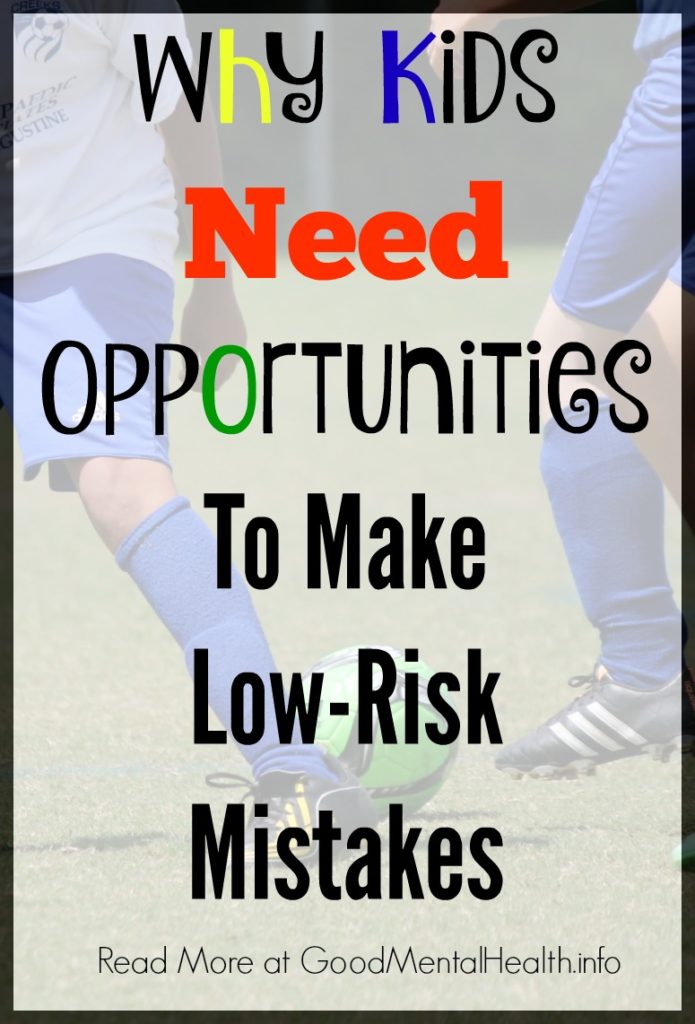When I showed up at college, I had never learned to cook, do laundry, or drive on an interstate.
I had also never burned myself on a hot stove, flooded the utility room, or driven a car over fifty miles per hour.
I was completely unprepared for adulthood, and what would be expected of me.
What I had done was make good grades, get into college, and learn to play the violin.
That was about it.
I had never really failed at anything I tried, but I had never really succeeded either.
Room to Make Mistakes
My twelve-year-old told me not long ago that the feels like he can’t make any mistakes.
Like there’s no room for error.
He’s going into seventh grade and he’s never gotten a B.
He works hard. He pushes himself. But he feels like expectations are too high.
Everything he tries, he feels he has to do perfectly.
What that tells me is he needs more room to make mistakes.
In fact, I need to actively put him situations where he will most likely make mistakes.
Because we learn who we are through the mistakes we make.
And I am failing him if I deprive him of the chance to get to know himself.
Organic Chemistry isn’t the place to learn to cook
Cooking is chemistry.
I didn’t know it at the time, but I was learning to cook when I enrolled in Organic Chemistry lab when I went away to college.
Thermal evaporation is reduction. It’s how you remove unnecessary water and get rich, succulent sauces in your sauce pan.
Syrups and jams are made by dissolving sugar into a heated mixture. Heat allows you to dissolve more solid into a liquid than should realistically be able to go. It’s called a super-saturated solution.
You get the idea.
I was trying to get into vet school at the time. I didn’t have room to fail organic chemistry.
Had I known how to cook, had I practiced some of this stuff before, organic chemistry would have felt a lot different. It wouldn’t have been so foreign to me. In my mind, I could have replaced the beakers for cook pots, the Bunsen burner for a stove top. But the process, and the theoretical knowledge, would have been the same.
Fettucinni alfredo is not often made for a grade, unless you’re a chef.
But phenylbenzene certainly is if you’re learning to be a chemist.
I really hate to cook. Perhaps, had I known that sooner, I would have realized I might not like chemistry much either.
Or, perhaps the difficult time in chemistry class has deprived me of the joy of cooking forever?
Opportunity for low-risk mistakes
My son made brownies for us last night.
After a really fantastic dinner (luckily, my husband does like to cook), we were all stuffed but craving dessert.
We had no ice cream, no cookies. No pre-made little bite of sweetness to top off our delicious meal.
Our sweet son comes out of the pantry holding a box of brownie mix: sea salt caramel, extra gooey, dark chocolate.
He wanted to make them.
I was cleaning the kitchen, washing the last of the pots and pans.
I didn’t want another go-round of dishes to clean, but caught myself before dismissively saying “no.”
He was offering. He was interested. He needed this experience more than I needed a clean kitchen.
This would be the first time he ever made something, start to finish, by himself.
He collected the ingredients, cracked the egg, combined in a bowl, poured the batter into a pan, skillfully added stripes of sea salt caramel on top, and baked for 38 minutes.
The only real supervision we provided was some coaching while he moved the pan in and out of the hot oven.
It was a low-risk opportunity to make some fun mistakes.
We have to let him do it. We have to encourage him to do it. We have to actively look for opportunities where he can do things like this more and more. Experience, practice, try, fail, and succeed. All on his own.
As it turns out, there was no brownie batter on the ceiling. No fires. No injuries.
No mishaps occurred, no mistakes were made. But they could have been.
And it would have been okay if they did. In fact, it may have been better if they did.
Because brownies are not for a grade but this experience will last him a lifetime.
*For more information on “good mental health” in parenting, including supporting individuation and strong identity formation, I highly recommend reading this, this
, and this
.
As always, if you found this information helpful, please share it. And if you feel you are in the exact right place and would like access to more resources and guidance, read more about the Good Mental Health team and join us on Facebook.
Disclosure: this page may contain affiliate links.




 Hi, I'm Diana Brummer a psychotherapist, writer, and coach in St. Johns, Florida. I love helping people thrive in their relationships and their lives. My hope is that you find the information in these articles educational and useful. Thank you for stopping by!
Hi, I'm Diana Brummer a psychotherapist, writer, and coach in St. Johns, Florida. I love helping people thrive in their relationships and their lives. My hope is that you find the information in these articles educational and useful. Thank you for stopping by! 
